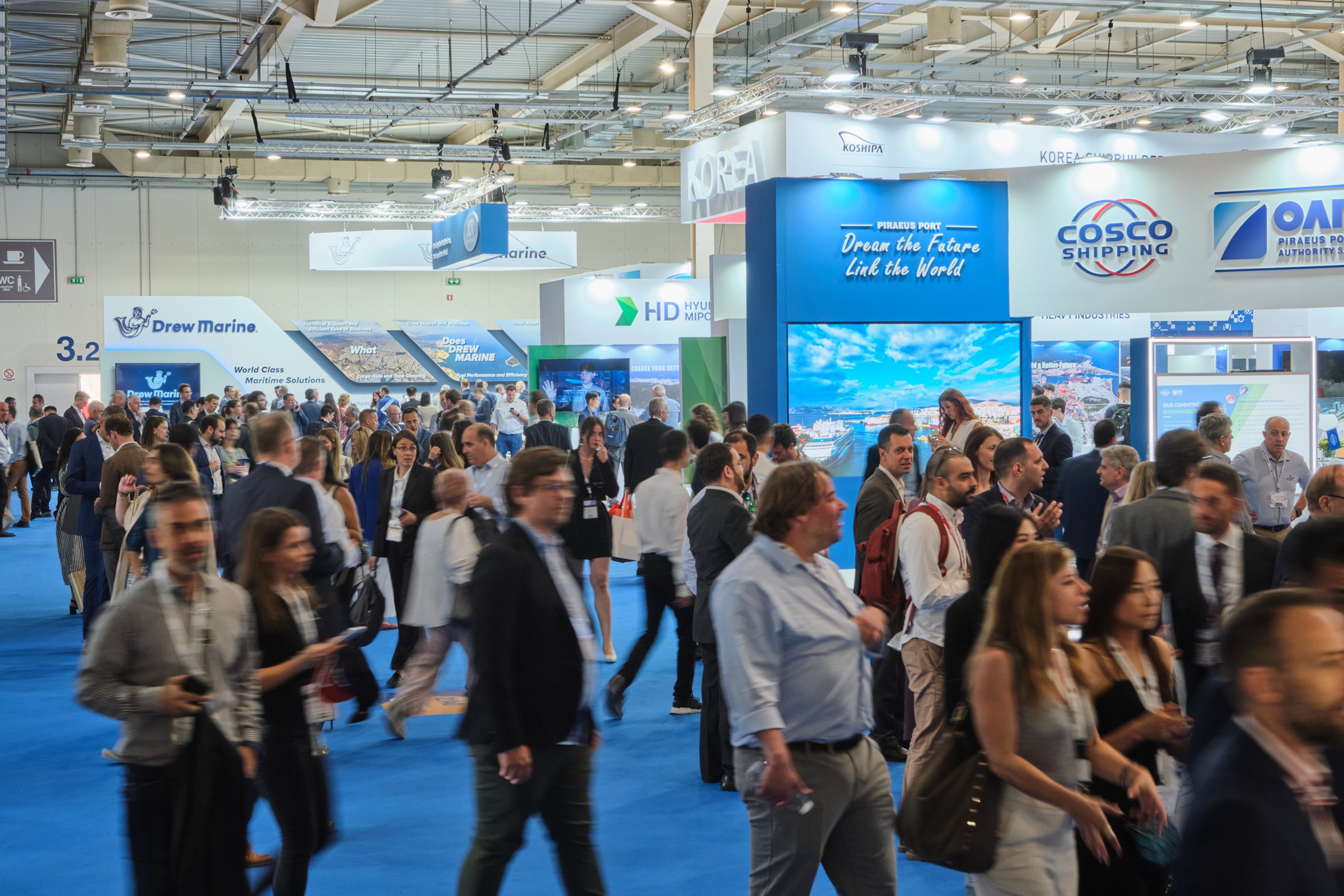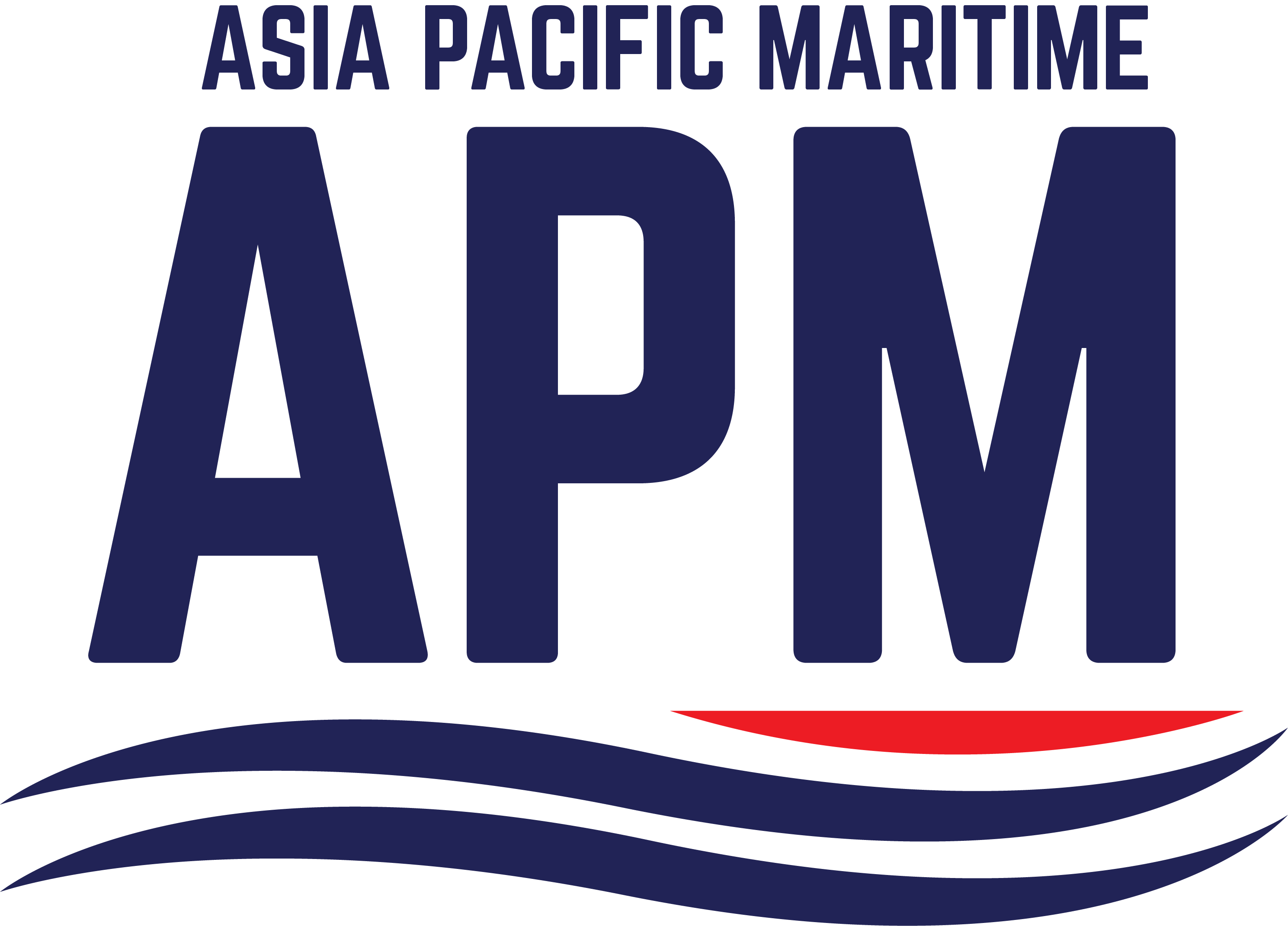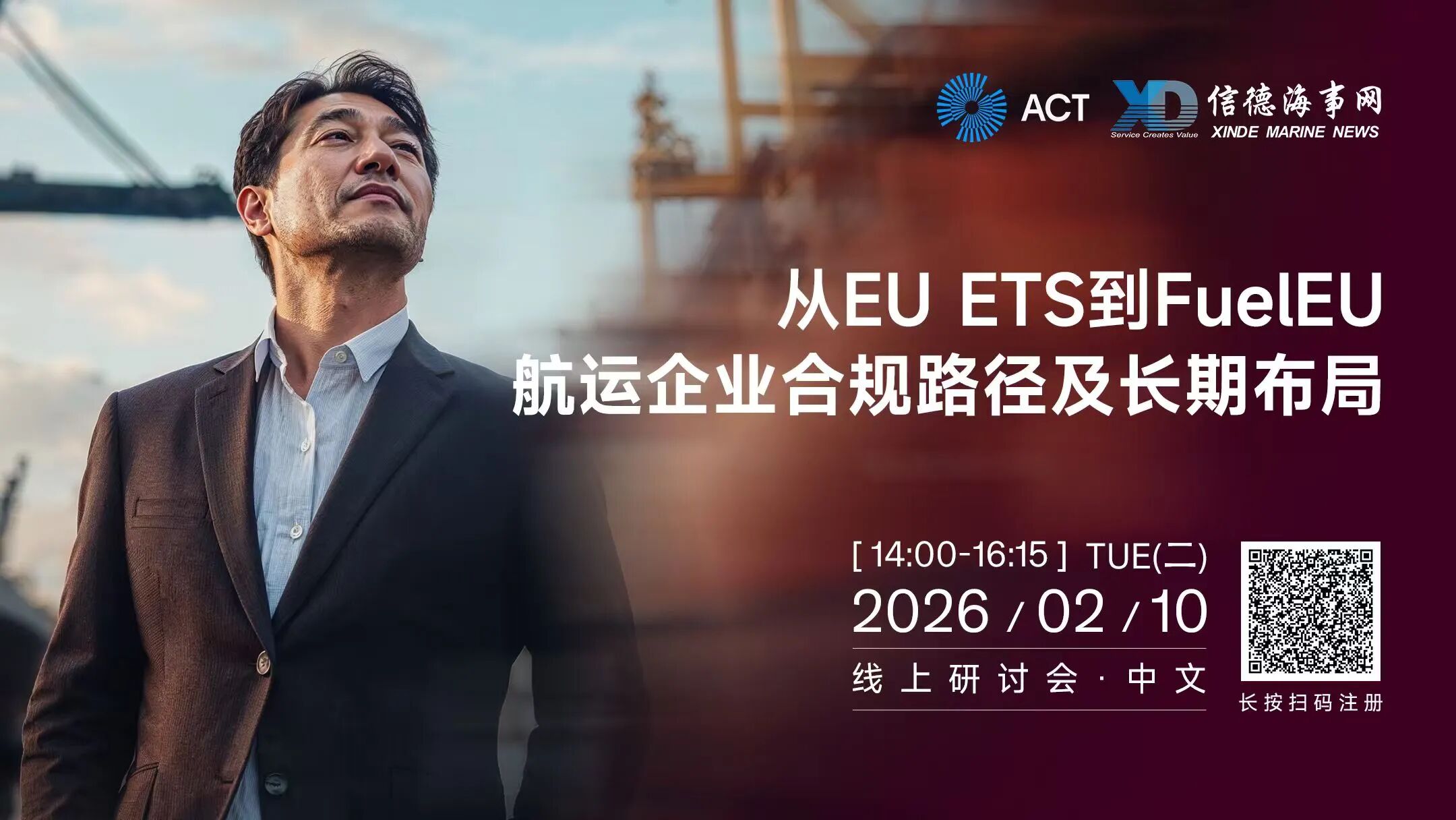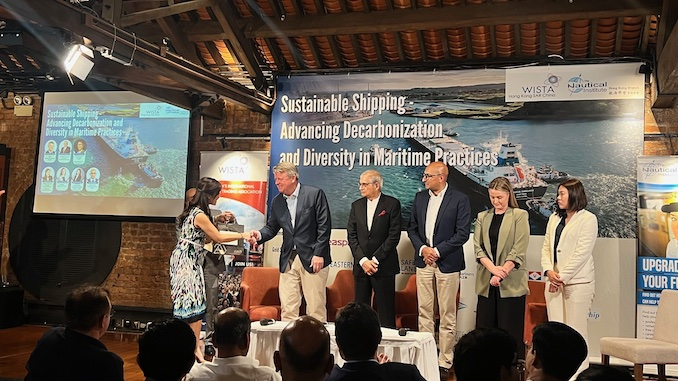
The Hong Kong branches of WISTA and the Nautical Institute gathered their resources for the first time to present “Sustainable Shipping – Advancing Decarbonization and Diversity in Maritime Practices”, a seminar for the industry at the Foreign Correspondents Club on Friday evening (20 June).
Nautical Institute chairman, Dr Kaushik Roy, noted the historic nature of the seminar as the first to be jointly organised by the Nautical Institute HK and the Hong Kong branch of WISTA in Hong Kong.
“Shipping sustainability as atopic is very relevant in the current context of diversity, equality, and inclusion, technological developments, trade wars, geopolitical disruptions, and the shortage of seafarers.”
Dr Roy paid tribute to the event sponsors, panellists, and guests for their unwavering support.
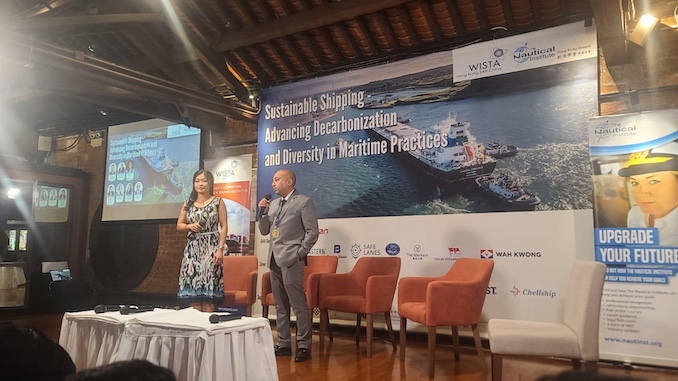

Joint organisers, Isabel Tse, president of WISTA and Dr Kaushik Roy, chairman of the Nautical Institute
As the chief development strategist at HKUST, with experience as under secretary for the Environment in the government from 2012 to 2017, Professor Christine Loh delivered the keynote speech which offered a local perspective on the first panel’s topic of the why, what, and how of shipping’s push for decarbonization and sustainable shipping.
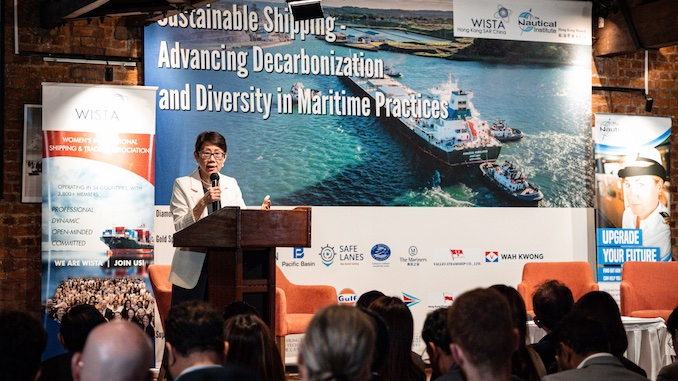

Professor Christine Loh delivered the keynote address
The main thrust of Professor Loh’s address was a call for greater cooperation and communication between the industry and government. A prominent example of the benefits to be had was the establishment of the Fair Winds Charter. Led by the industry, it was the agreement to voluntarily switch to low sulphur fuel while at berth in Hong Kong in 2013. This became mandatory in 2015 and culminated in the creation of the Pearl River Delta Domestic Emission Control Areas being required to run on low-sulphur fuel with the sulphur content not exceeding 0.5% from 1 January 2019 onwards.
It was a move that put Hong Kong on the map as a jurisdiction intent to tackle maritime pollution. However, the momentum was lost in the ensuing ten years from 2015 until the Marine Department introduced its green incentive for Hong Kong registered ships in 2024, and the Government presented its plans for green maritime fuels bunkering in the same year.
On this latest development Professor Loh maintained that the green fuel resources available in China offered Hong Kong an advantage, and the opportunity to be among the first movers in the business of supplying the global industry the fuels of the future.
While confirming Hong Kong’s intent to demonstrate methanol bunkering in local waters before the end of the year, Prof Loh said there was now an urgent need to get the infrastructure in place, to obtain the green fuels from the Mainland, and to get the regulations introduced. This could best be achieved by the industry and government partnering to ensure that robust regulations are introduced that would be applicable globally.
In opening the first panel discussion, Martin Fruergaard CEO of Pacific Basin took a moral but conciliatory approach to the topic stating baldly: “Decarbonization makes sense and it is the right thing to do. Young people want to work for companies that do the right thing.” He did recognise that, “some firms can afford to make more important decisions than others. Some can afford it more than others. I don’t think we should blame anybody for being slower than others.”
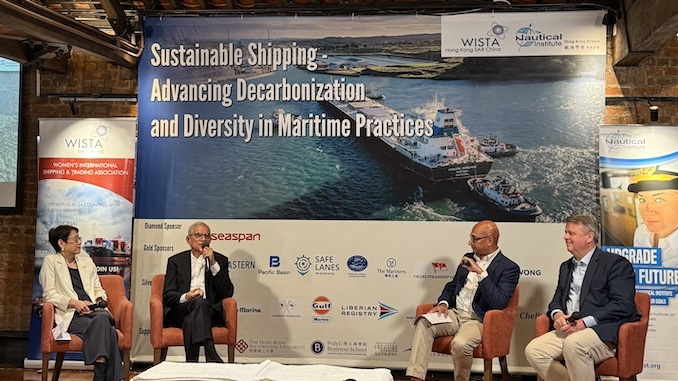

Decarbonization panel: from left to right Prof. Christine Loh, Dr Kishore Rajvanshy, PB Subbiah (moderator) and Martin Fruergaard
Pacific Basin demonstrated that it is in the first camp when it ordered four dual-fuel methanol low-emission ultramax vessels in November 2024.
Joining the panel, former managing director of Fleet Management Kishore Rajvanshy was tasked with answering the question why shipping with its responsibility of just 3% of global greenhouse gas emissions (GHG) should be thrust to the front of the queue when it came to the task of decarbonizing? While not answering the question directly the argument he offered clearly indicated that the amount of GHG shipping was responsible for was not the issue. Addressing the problem was of paramount importance.
“Future Generations should be able to enjoy their lives. And we should not destroy the planet,” he declared.
Since 2023 the planet has been subject to 58 gigatons of GHG annually, he said. “This level of emissions has been reached for the most part over the last 30 years. And of this total, the transport sector is responsible for 15%. The largest component – 74% of the 15% – comes from road transport. Aviation shares the remainder with shipping,” he added.
While recognizing the contribution made by energy saving devices (EDS) Dr Rajvanshy maintained that at the end of the day only the new green fuels will achieve the aim of net zero emissions in the global shipping sector. In this respect Mr Fruergaard insisted that the industry had made much progress and now was the time to for the industry to support and consult with the potential suppliers.
“Coal consumption has peaked in China and alternative fuel solutions will become more important. I don’t think there will be a single fuel solution, although we believe that methanol will work for us,” he said.
“It will not be hard for shipping to adapt. It’s more about the willingness to do so. It is expensive but I feel sure that the IMO and national governments will do much to alleviate that,” he concluded.
Dr Rajvanshy begged to differ, at least in the short to medium term. “Only 20% of the ships being built today are dual fuel, while 80% of the ships are being built for fossil fuel propulsion. These shipowners will be restricted to deploying EDS.”
Assuming they were prepared to pay for the investment.
From his experience as a ship manager, Dr Rajvanshy insisted that neither small nor large shipowners were keen to spend money. “Some of the larger companies with deep pockets have the luxury of experimenting. They might fit rotary sails on some of their ships at a cost of several million dollars. But they will not install such devices across their fleets,” he said.
The second panel took on the topic of “Diversity, Equity and Inclusion (DEI) in Shipping.”
As president of WISTA Hong Kong and deputy technical director at Saga Shipholding, Isabel Tse was able to offer promising progress from both sides of the debate.
Saga Shipholding is a wholly-owned NYK subsidiary operating in Norway. Ms Tse was happy to announce that the company had introduced a program to place female cadets on several of its ships with the focus being to ensure the safety of the female cadets onboard. Even to the extent that the introduction of female only washrooms is being discussed. Meanwhile NYK has said it will attempt to increase managerial positions occupied by women within the company to 30% by 2030. That’s the good news. But..
Ms Tse also told the delegates that according to the 2024 IMO-WISTA Women in Maritime Report women account for just 1% of seafarers. “As an industry we have the responsibility to encourage female students to study maritime related subjects such as naval architecture and marine engineering,” she said.
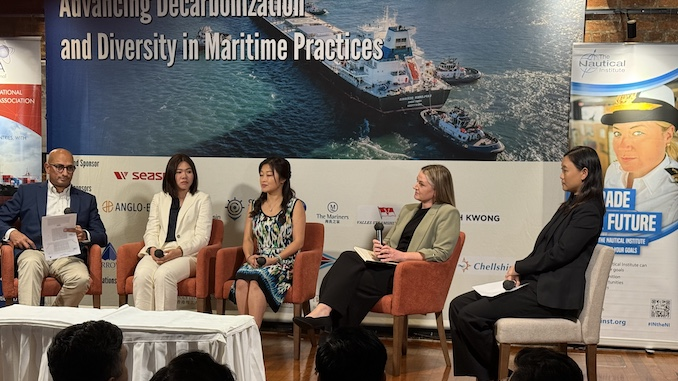

Diversity panel: from left to right: PB Subbiah, Joanna Kwok, Isabel Tse, Elizabeth Sloane, Cheri Leung (moderator)
“As shipping companies, we have the responsibility to create a safe environment onboard the ship for women to join the industry as seafarers.”
Meanwhile, on the ground, WISTA Hong Kong, in celebration of the International Day for Women in Maritime, has been collaborating with Hong Kong PolyU to introduce shipping as a career while offering further advice to students who demonstrate an interest. “We have also supported the Marine Department for a few years with their youth group program by organizing company visits to Wah Kwong and Pacific Basin,” she added.
Of course, a lack of DEI is not limited to shipping, as Elizabeth Sloane, a partner with Stephenson Harwood and an arbitrator, was keen to point out.
“We don’t often think about how DEI affects dispute resolution,” she began.
“Arbitration is a powerful example because arbitration gives the individual parties a lot of control of the process. It is designed to be that way. It is a key benefit of arbitration.
“Obviously in maritime we want to be able to choose our arbitrators because the disputes are frequently specialized and often technical. How does DEI influence arbitration? Specifically, through the selection of arbitrators. And diversity of maritime arbitrators is an issue,” she said.
“There are very few female maritime arbitrators. In Hong Kong there are very few female arbitrators. Why do we want gender diversity in our selection of arbitrators? She asked. “It’s exceptionally important because we want diversity of thought and opinion when people are determining a dispute. We don’t want three people from very similar backgrounds making decisions because we want critical and analytical problem solving. We want people to bring their own experiences and backgrounds to that process, and we want creativity of thought in resolving a dispute.
Ms Sloane insisted: “Diversity in arbitration is important because it removes the perception of bias. And independence and impartiality in dispute resolution is important to the administration of justice, trust in the process and having confidence behind the process that we are using to determine disputes. Increasing diversity will in turn increase the pool of maritime arbitrators and lead to more choice.”
For the record, the Hong Kong Maritime Arbitration Group appears to have 12 full members of which one is female, and 33 members, eight of which are female.
On the bright side, Ms Sloane referred to statistics published annually by the Hong Kong International Arbitration Centre on its appointment of arbitrators in any given year.
“The reason this is important is that it is a good opportunity for new arbitrators to be introduced to the parties and to increase the diversity within the pool,” said Ms Sloane.
In 2024 of the 199 appointments made by the HKIAC 69 of the arbitrators were female or approximately 35%. Of the 199 appointments about 10% would probably have been for maritime arbitrations. Of that 199 appointments 17 were arbitrators who had not previously been appointed by HKIAC in the previous three years.
For first-hand experience of a female who has done the time onboard, the panel turned to Joanna Kwok, once lauded for being Hong Kong’s first female chief engineer. She is now assistant environment compliance manager at Anglo-Eastern Ship Management where she began her seagoing career.
Ms Kwok introduced a note of levity to proceedings by recalling that when she joined her first ship as an engineering cadet: “I was the only female and the only Hong Konger on the ship. I faced gender stereotype bias and nationality stereotype bias. All my colleagues were Indians, and they thought I was a spy from the Hong Kong office.
“It was not so difficult once the crew got used to me because they came to judge me on my ability rather than my gender or nationality,” she said.
“Over the years I have had the good fortune of working on different types of vessels including bulkers, tankers and containerships. During that time, I progressed from engine cadet to chief engineer. Since coming onshore, I have worked in the technical department, the QSE department and now in environmental compliance.
“Anglo-Eastern has always focused on my my ability rather than my gender or nationality. This is DEI in action, she declared. But also noted that the DEI initiative is not exclusively a gender issue. “We should welcome diverse nationalities, religions and sexual orientation,” she said.
The panel’s recognition of the need for DEI was expressed with the inclusion of Pacific Basin’s HR director PB Subbiah. Mr Subbiah suggested that there can never be complacency when women as a percentage of those working in agriculture, mining, and logging is 10 time higher than those working on ships. “The suggestion that women cannot work on ships because it is too hard is ridiculous,” he said.
Mr Subbiah maintained that at Pacific Basin “we are gender blind. We don’t actively target women to come and work for us but when we receive an application, we never reject it simply because the application came from a woman.”
Mr Subbiah conceded that five years ago the company did not have a shared understanding of what DEI is and why it is important. Since then, Pacific Basin hired consultants and spent three to four months familiarizing staff with its tenets.
Joining WISTA and the Nautical Institute in this dual-topic event can be marked down as a success, particularly in its ability to attract more female delegates. If there is any quibble to be made it was in the lack of time for questions from the floor. There was plenty to debate particularly for the second panel session, given that the audience was around 80% male.
source: Hong Kong Maritime Hub
source: Hong Kong Maritime Hub
The opinions expressed herein are the author's and not necessarily those of The Xinde Marine News.
Please Contact Us at:
media@xindemarine.com


